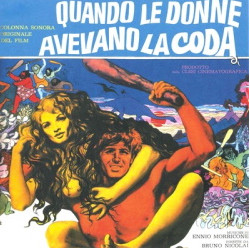QUANDO LE DONNE AVEVANO LA CODA (1970)
Quando le Donne Avevano la Coda – translated to ‘When Women Had Tails’ – is an Italian sex comedy directed by Pasquale Festa Campanile, set in pre-historic times when ‘women had tails’ and were hunted by cavemen. Giuliano Gemma plays Ulli, the eldest of seven orphan cavemen who grow up on an isolated island. After a fire burns all their crops, Ulli leads his brothers off the island to find a new home, and while out hunting one day they come across Filli (Senta Berger), a beautiful ‘cave-woman’. As none of the brothers have ever seen a cavewoman before, naturally, they want to kill and eat her – but Filli has other ideas, and tries to use her ‘feminine wiles’ to seduce Ulli and save her life.
The score for Quando le Donne Avevano la Coda is very, very peculiar. It features an orchestra, the chorus of I Cantori Moderni di Alessandroni, and specialist instruments including keyboards, guitars, marimbas, and more, but that description of simple facts doesn’t really come close to capturing just how odd the score is. The main title cue, “Quando le Donne Avevano la Coda,” begins with a bizarre muted keyboard rhythms over which Morricone layers a deep, croaking male vocal saying ‘ah-wa,’ a breathy female vocal effect, and an oddly comedic recorder theme that is catchy and pretty and quirky, but then becomes even more so when the light 70s lounge rock arrangements kick in. This is what I love about Morricone so much – who on earth could have possibly come up with this combination of sounds for a prehistoric sex comedy? It’s just brilliant; insane, unexpected, so clever.
And so on the score goes. “Nascita di Filly” features breathy, slightly erotic come-hither female vocals over a lilting instrumental base, and reprise of the main theme featuring some brilliant bulbous tuba chords. “Can Can Delle Filly” is a fabulous bossa nova jazz piece that it is impossible not to dance to. “Marcetta dei Sette” is a reworking of the main theme for recorder and Jew’s harp which makes it sound like the insane cousin of La Moglie Più Bella. “I Civettoni” sounds like a variation on ‘Twinkle Twinkle Little Star’ offset with a flirtatious classical violin solo. “Ulli, Grr, Malug, Put, Uto, 204, KAO” returns to the ‘wa-wa-wa’ voices in what can only be described as 1960s psychedelic laid-back country music comedy romance – maybe?
“Balletto Sulle Uova” is so bizarre as to almost defy description, except to say that’s essentially instrumental farting and popping. The subsequent “Pantomima Delle Caverne” builds on this by adding grunting to the mix, as well as an off-kilter statement of the main theme, a dainty music box ballet sequence. “Introduzione all’Introduzione di Una Introduzione” offers a variation on the can-can theme which is wonderfully infectious, while the conclusive “Preludio Alal Gioia” builds up slowly but eventually becomes something of a dance-like celebration, blending many of the score’s unique and idiosyncratic ideas into a buoyant whole. The entire thing is just so cheerful and upbeat and silly and cheesy and good-natured that you can’t help but swept along by it.
There are several versions of the soundtrack for Quando le Donne Avevano la Coda, several of which pair it with music from its 1972 sequel Quando le Donne Persero la Coda, which was scored by Bruno Nicolai. The version I have reviewed here is the CD re-issue of the 11-track original LP released by Contempo Records, and it comes highly recommended if you want to listen to a score which slaps a stupid smile on your face while you marvel at Ennio Morricone’s endless creativity.
Track Listing: 1. Quando le Donne Avevano la Coda (2:45), 2. Nascita di Filly (2:51), 3. Can Can Delle Filly (5:33), 4. Marcetta dei Sette (2:08), 5. I Civettoni (4:20), 6. Ulli, Grr, Malug, Put, Uto, 204, KAO (3:44), 7. Balletto Sulle Uova (1:40), 8. Can Can Delle Filly #2 (4:02), 9. Pantomima Delle Caverne (3:04), 10. Introduzione all’Introduzione di Una Introduzione (1:16), 11. Preludio Alal Gioia (1:59). Contempo CD-2001, 33 minutes 27 seconds.












